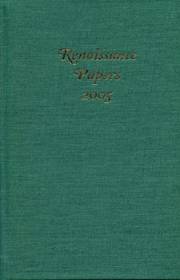Book contents
- Frontmatter
- Contents
- Renaissance Papers
- Bronzino, Castiglione, and A Self-Portrait: Re-evaluating Bronzino's Trip to Pesaro
- Tracing Astrophil's “Coltish Gyres”: Sidney and the Horses of Desire
- Shakespeare's Twins: Choric Juxtaposition
- Rhetoric and Intimacy in The Tempest
- “That Holy roome”: John Donne and the Conduct of Worship at St. Paul's Cathedral
- Conversation in Hutchinson's Order and Disorder and Milton's Paradise Lost
- Dryden on Epicoene's “Malicious Pleasure”: The Case of the Otters
Dryden on Epicoene's “Malicious Pleasure”: The Case of the Otters
Published online by Cambridge University Press: 12 September 2012
- Frontmatter
- Contents
- Renaissance Papers
- Bronzino, Castiglione, and A Self-Portrait: Re-evaluating Bronzino's Trip to Pesaro
- Tracing Astrophil's “Coltish Gyres”: Sidney and the Horses of Desire
- Shakespeare's Twins: Choric Juxtaposition
- Rhetoric and Intimacy in The Tempest
- “That Holy roome”: John Donne and the Conduct of Worship at St. Paul's Cathedral
- Conversation in Hutchinson's Order and Disorder and Milton's Paradise Lost
- Dryden on Epicoene's “Malicious Pleasure”: The Case of the Otters
Summary
DRYDEN identifies the “malicious pleasure” Jonsonian comedy affords its spectators in his Essay of Dramatick Poesie, in which he proclaims Epicoene “the pattern of a perfect Play.” Written in 1665, the examen of Epicoene is the first sustained formal criticism of a literary work in English. Dryden's admiration of Jonson's dramaturgy draws on his immersion in the Workes (he refers to half of Jonson's plays in the span of the Dramatick Poesie, discussing many—including the famously disparaged “dotages”—in fluent detail), confirming his professed ideal of emulating the dramatic practice of the principal Jacobean playwrights. It is an intense, riveted admiration that prompts Dryden's speaker Neander to engage with Epicoene's stagecraft in such novel detail and that draws from him the admission: “But I dare not take upon me to commend the Fabrick of it, because it is altogether so full of Art, that I must unravel every Scene in it to commend it as I ought” (17:61). His attentiveness to Jonson's dramaturgy is designed to be of immediate benefit to the Restoration playwrights learning their craft in the 1660s, when, after the long hiatus when the public theaters were closed during the civil wars, the theaters opened but relied largely in the early to mid-1660s on a prewar repertoire. Dryden studies Jonson's plays both from the perspective of a literary historian who is inventing modern literary criticism in his Essay and from the vantage point of a professional playwright “surveying the current theatrical scene” where, as Cedric Reverand has argued, the Jacobean “fathers” are very much of the moment, present as competitors and as models for dramatists just learning their craft.
- Type
- Chapter
- Information
- Renaissance Papers 2005 , pp. 103 - 120Publisher: Boydell & BrewerPrint publication year: 2006



